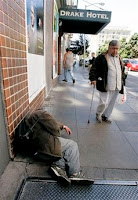- Matthew 25:34-36
This past week, I was privileged to spend time in San Francisco with Lutheran Campus Ministry at Northern Arizona University. We went to see how the church was adapting to and embracing the LGBTQ community as well as to witness to the desperation of the homeless community. To say the experience was powerful is an understatement.
I went in expecting to be a spectator, tapping on the glass of an urban zoo, but much to my surprise, I was fully immersed in the city and its complexity. I heard the stories of the homeless of San Francisco. I saw them as human beings and in them, I saw the presence of God.
My week in San Francisco will require months — if not years — to process and decipher. The interactions I had with members of the larger community and the bonds I formed with the smaller LCM community over late night discussions and shared experiences has shaken my faith and strengthened my desire to learn more.
The city itself is a contradiction. Poverty and decadence go hand-in-hand with one another. I remember one night, I sat and spoke with a homeless man (who in all honesty was a human Bible, constantly quoting scripture). His hands and face were filthy and right across the street was a Macy's and a Tiffany's. Everything he could not have was right there — where the homeless and the wealthy share the same streets. Despite all this, he said with a grin, "I'm not homeless. I'm just not home yet." I was struck by the stark socioeconomic stratification that we in America see everyday. Why are we not outraged? Perhaps more importantly: Why aren't we motivated to do something about it?
We have heard this story from Matthew many times and we tend to focus on the first section, where Jesus praises those who help the needy. Yet, I find that I usually fall into the second group — the people who ignore the "untouchables" of our society. We brush past the beggar with his plastic cup and we avoid eye contact with the lonely woman at the bus stop who just needs someone to talk to her. In our minds, we find ways to justify it. "Why doesn't she get a job?" "He just wants money to get drunk or high." Maybe that is the case, but it doesn't mean we shouldn't treat them with dignity. Maybe all they really need is a smile or a kind word. Maybe they just need someone to validate their humanity.
To all of us who would rather pretend like they're not really there, Jesus has his message:
"'Depart from me, you who are cursed, into the eternal fire prepared for the devil and his angels. For I was hungry and you gave me nothing to eat, I was thirsty and you gave me nothing to drink, I was a stranger and you did not invite me in, I needed clothes and you did not clothe me, I was sick and in prison and you did not look after me.'
"They also will answer, 'Lord, when did we see you hungry or thirsty or a stranger or needing clothes or sick or in prison, and did not help you?'
"He will reply, 'Truly I tell you, whatever you did not do for one of the least of these, you did not do for me.'"
- Matthew 25:41-45
My experience was uncomfortable at times, but it's when we are at our most uncomfortable that we often encounter the divine. Jesus is here among us, but he is not sitting in the pews of our churches and he is not attending dinner parties in the rich neighborhoods of San Francisco. He is sleeping in a doorway tonight without a blanket, without the medicine he needs and without so much as a friendly smile from a stranger.
What do we do with that? I don't know, but together, maybe we can figure it out.



